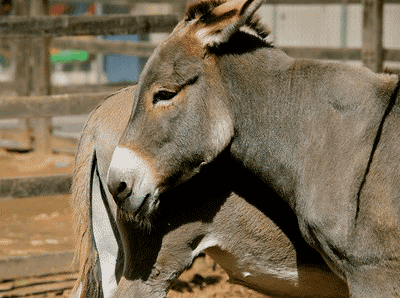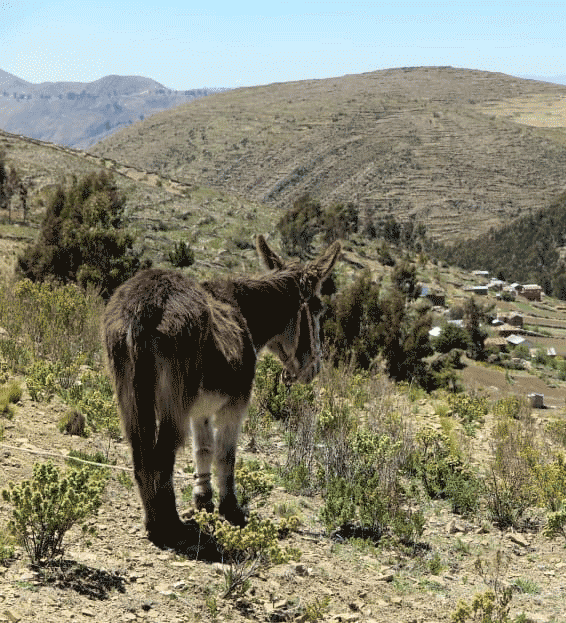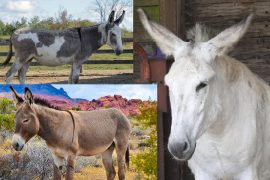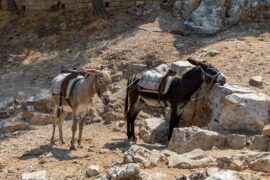Donkeys, on average, have a lifespan between 27 to 40 years. As they live long, owning a donkey is a big commitment. An aspiring donkey owner should take into consideration the time, effort, money, and commitment involved in taking care of a donkey for such a long period.
Now let’s go ahead and learn more about a donkey’s lifespan and how you can keep them longer with you as a loving companion.
How Long Do Donkeys Live Under Different Conditions?
Donkeys are referred to as beasts of burden due to the heavy work they are allotted to do, mainly carrying large loads. But then you might be surprised to know that donkeys have a longer life span than you must have expected for an animal that works so much. On average, donkeys’ life expectancy lies between 27 to 40 years, and that is pretty huge considering all the factors. And this number is even higher than the years horses live.
But note that the lifespan of donkeys differs from place to place and the conditions they live in. For example, in Ethiopia, donkeys live up to the age of 9 on average and with proper care can be extended up to 25 years. And in Mexico, 15 years is the average age to which a donkey lives.

Domestic Donkeys and Wild Donkeys; Do their Lifespans Differ?
A donkey in the wild has a lifespan of 27 to 40 years, and with better conditions, it could be extended to 50. When they are in the wild, donkeys often die from infections or anatomical issues. This is not the condition with donkeys in captivity. Domestic donkeys are found to live to the age of 33, though several factors affect the number depending on the geographical conditions where they live and the kinds of work they do. But still, they do not face as many threats as donkeys in the wild, nor are their needs and health requirements compromised.
Donkeys, when kept as pets, are found to live about 40, though health-related problems could meddle with the numbers. But still, you can be assured that your donkey will be around for some time. If you can keep your donkey stress-free and healthy, it is guaranteed that your donkey will live to its maximum. Try keeping them happy and content, and that’s the key.
As already mentioned, if adequately cared for and looked after, donkeys can surpass the years predicted by statistics. The oldest living age, known for a donkey is about 62 years old, which is double the age of what is expected from a donkey normally. This donkey named Bubbles was born around the end of 1950s and is from the UK. The previous record was with another donkey named Suzy, who lived in Mexico and died at the age of 54.
The Life Cycle of a Donkey
The life cycle of a donkey is similar to that of other mammals. The mother donkey carries the baby in the womb for 12 months before delivering a healthy baby donkey, called a foal. During pregnancy, a donkey only gives birth to one foal, and twins happen very rarely.
Male donkeys or jacks achieve sexual maturity around 8 months to 1 year, while females or jennies go into heat from the age of 8 months to 2 years. The gestation period once pregnant lasts from about 10 to 14 months, and most foals get properly developed around 12 months. Since they are born properly developed, the foals will be able to stand up on their own within one hour of birth and may even start walking and running the same day. They are also born with teeth that help them in eating foods other than their mother’s milk.
Once they are off the mother’s milk, around 4 to 6 months from birth, and rely on plants and other food items, the foal enters the stage before they are considered adults. With the emergence and settling of their second set of teeth, a donkey is considered an adult. By this time, their bones must have developed fully. And these happen around the ages of 3 to 5.

How to Keep Your Donkeys Around Longer?
The key to keeping any animal healthy and satisfied is to keep them happy and relaxed. If you can provide them with their basic needs, they will live longer for sure. And one such basic requirement of the donkey is that they need a companion to survive. Donkeys live longer and are happier when they have a pair or a companion like a horse. The bonds they create are pretty strong ones, and their roots go deep. The lack of such a companion could lead your donkey to feel lonely and depressed and to other health problems.
Watching your donkey’s diet is also crucial to keeping them healthy. Donkeys have a very efficient digestive system, which allows them to absorb nutrients from the driest vegetation they consume. This system which was developed for them to survive in extreme conditions comes as a threat when they have plenty to eat. Donkeys could gain weight and become overweight easily because of this. And this could lead to serious health problems for them. Monitoring their diet, so that they do not consume much sugar and protein is also important.
Regular health checkups and proper medications also have a significant role in keeping them healthy. Donkeys have this habit of not showing their discomfort till they couldn’t bear it anymore. So, it is important to keep a close watch on them for the behavioral changes they display. The most common issue donkeys might face is problems with their teeth, which could lead to them not being able to chew food properly. Make sure that you conduct proper hoof care and maintenance as well.
Keeping your donkey parasite free is also crucial when it comes to keeping your donkey healthy. Ensure that the donkey undergoes regular deworming and is free from parasites like lungworms. They could cause serious health problems and could even shorten the lifespan of your donkey.
Conclusion
Donkeys can live between 27 to 40 years depending on their living conditions. A donkey will be an adorable asset to you and a companion who will be there for you for a long time. The only condition in place is that you treat them well and take care of them. All the benefits donkeys offer and the little effort you have to put in to maintain them make them the best animals to own. So, it is time you stop worrying about your donkey leaving you because donkeys are here to stay.

![How Long Do Donkeys Live? [Plus How to Keep Them Longer?] how long do donkeys live](https://donkeyonfarm.com/wp-content/uploads/2023/01/How-Long-Do-Donkeys-Live.jpg)



![What Are Mules Used For? [How Are They Better?] what are mules used for](https://donkeyonfarm.com/wp-content/uploads/2023/08/preview16_11zon-270x180.jpg)
![What are the Differences Between a Mule and a Hinny? [Which is Better?] difference between a mule and a hinny](https://donkeyonfarm.com/wp-content/uploads/2023/08/difference-between-a-mule-and-a-hinny-270x180.jpg)